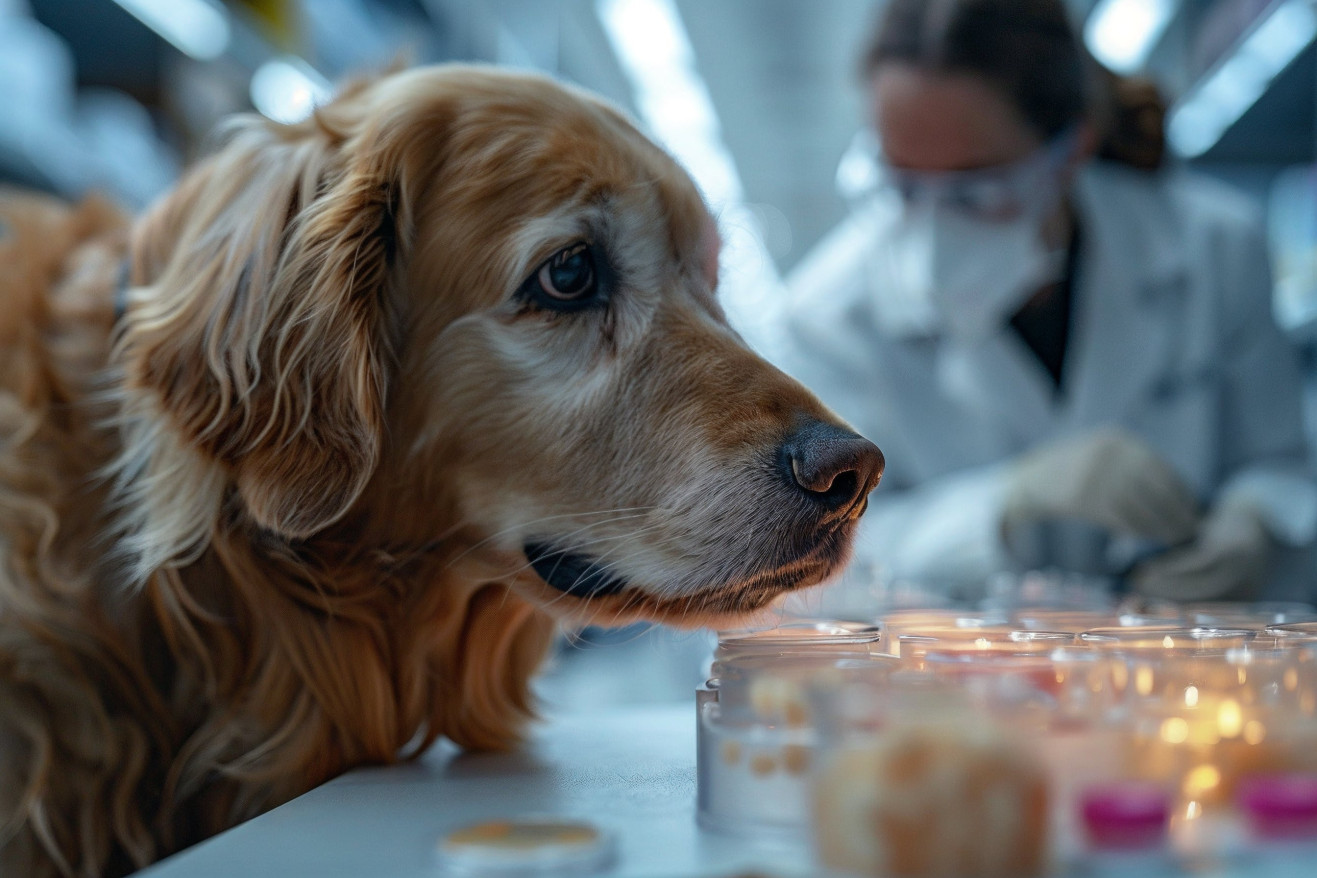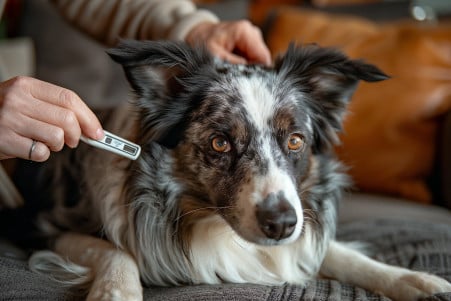Can Dogs Get C. Diff? Exploring the Species Barrier
6 June 2024 • Updated 5 June 2024

Although C. diff infections are most commonly found in humans, many dog owners wonder if their pets can also get the dangerous gastrointestinal condition. Fortunately, dogs cannot get C. difficile infections. The bacterium Clostridioides difficile, which causes antibiotic-associated diarrhea and colitis, is only found in humans and some other primates, such as monkeys. Dogs have a different microbiome that protects them from C. diff.
This article will look at the details of why dogs can't get C. diff from the most recent studies in veterinary medicine and microbiology. This will help you understand the biological reasons for these differences and how different species have evolved their own microbiomes and immune responses to pathogens like C. difficile. This will also help dog owners better understand and feel less worried about this human-specific condition.
Can dogs get C. diff?
Risk Factors and How C. diff Is Spread to Dogs
While dogs cannot get C. diff infections, they can be exposed to and spread the bacteria. Dogs that live with immunocompromised people or people taking antibiotics are more likely to be carriers of C. diff, and this is likely due to the fact that their owners are more susceptible to infection and transmission. Dogs that visit veterinary clinics and hospitals are also at risk because they may be exposed to C. diff strains from infected patients.
It is possible that dogs could be exposed to C. diff from animal reservoirs through contaminated food sources like retail meat or water. However, the most common way that dogs are exposed to C. diff is through direct contact with the feces of humans or other animals that are carriers of the bacteria. Knowing these risk factors can help dog owners take steps to prevent and reduce the risk of exposure and transmission.
Although dogs cannot get clinical C. diff infections, the fact that they can be carriers of the bacteria means that there is a risk of transmission, especially to people who are at risk. By knowing the different ways that dogs can be exposed to C. diff, dog owners can take steps to prevent exposure and transmission to their pets and themselves.
Diagnosis and Symptoms of C. diff in Canine Patients
Dogs do not get C. diff infections, but veterinarians may still come across the bacteria in their canine patients. Standard human tests for C. diff toxins are known to have low sensitivity in dogs with diarrhea, according to the Mayo Clinic. In addition, healthy dogs can be asymptomatic carriers of toxigenic C. diff strains, according to research published in PMC.
That said, C. diff has been associated with chronic or recurrent diarrhea in dogs. While the Mayo Clinic notes that watery diarrhea, abdominal pain, fever, and dehydration could be signs of a C. diff infection, it also points out that these are general symptoms of diarrhea and not specific to C. diff. Diagnostic measures for veterinarians may include fecal testing, an evaluation of the gut microbiome, and a process of elimination to rule out other causes of gastrointestinal problems.
Although the presence of C. diff in dogs doesn’t necessarily mean that it needs to be treated directly, knowing how it’s diagnosed can help pet parents and veterinarians make sure that there aren’t any issues. Once the bacteria is identified and the gut is evaluated, the right management plan can be put in place.
Treatment and Management Strategies for C. diff in Dogs
Although dogs can't get C. diff infections, veterinarians may use antibiotics like metronidazole to treat C. diff-associated diarrhea or other gastrointestinal problems in dogs. DoggyBiome reports that while antibiotics can be effective in the short-term at getting rid of the C. diff bacteria, they can also kill off the dog's healthy gut bacteria, which can cause the infection to come back.
Dietary interventions and high-fiber diets have been shown to be more successful at relieving symptoms and rebalancing the gut microbiome, as explained by VCA Animal Hospitals. Probiotics and fecal microbiota transplants, which are designed to restore the gut's healthy bacteria, have also been shown to be effective in treating chronic or recurrent cases. Studies in PMC have found that fecal transplants are more effective than antibiotics at preventing C. diff re-infection in people.
It's also important to treat any underlying conditions, such as inflammatory bowel disease, in order to effectively manage the condition, according to VCA Animal Hospitals. Although dogs can't get C. diff infections, veterinarians will need to take a holistic approach to treating any gastrointestinal issues that may be related to the condition.
Dogs as Potential Reservoirs for Human C. diff Infections
There is evidence of C. diff strain overlap between dogs and humans, indicating that dogs may be reservoirs for the bacteria. One study published in PMC found toxigenic C. diff strains in 10% of canine fecal samples, and genotyping showed that the strains were similar to those found in humans. This suggests that companion animals may be a source of community-acquired C. diff infections.
In addition to being reservoirs, dogs may also be asymptomatic carriers of C. diff and spread the bacteria to their human owners. ScienceDaily reports that more than 25% of the domestic pets they studied were asymptomatic carriers of C. diff, and the strains they carried were the same as those found in their human contacts. Dog paws and human shoes can be contaminated with C. diff, leading to environmental contamination, as research from Clinicians Brief has demonstrated.
Although the risk of transmission from dogs to humans is relatively low, some C. diff strains found in dogs are antibiotic-resistant, which is a concern. Pet owners should be aware of the potential for zoonotic transmission and take steps to prevent it. This includes practicing good hygiene and following veterinary recommendations.
Preventing C. diff Transmission: What Pet Owners Can Do
Although the risk of transmission from dogs to humans is relatively low, pet owners can take steps to reduce the possibility of exposure to C. diff. The IZSVe study found that some of the C. diff strains in dogs were toxigenic and resistant to antibiotics, which suggests that zoonotic transmission is a possibility.
To prevent the spread of C. diff, pet owners should practice good hygiene, including washing their hands after coming into contact with their pets or their pets’ excrement. The Clinicians Brief also suggests that dog paws and human shoes can be a source of contamination, leading to environmental transmission. Cleaning and disinfecting pet areas can help prevent this from happening.
In addition, HCPLive recommends that pet owners avoid taking their pets to places where they may be exposed to C. diff, such as hospitals and nursing homes. If someone in the household is infected with C. diff, pet owners may also want to talk to their veterinarians about testing their pets, as they could be carriers even if they don’t show any symptoms.
In the end, it’s important for pet owners to work with their veterinarians to ensure that their pets are only given antibiotics when they’re absolutely necessary and to make sure that their pets have a healthy gut microbiome. This will help reduce the likelihood of zoonotic transmission. By doing this, pet owners can make sure that their pets and themselves are safe.
Conclusion: Understanding the Complex Relationship Between Dogs and C. diff
Although dogs cannot get C. diff infections, they can carry and potentially serve as a reservoir for the bacteria. The risk of transmission from dogs to humans is relatively low but should not be ignored. Responsible pet ownership, hygiene practices, and veterinary guidance can minimize any risks.
Further research is needed to fully understand the zoonotic potential and implications of C. diff in pets. Exploring species-specific gut immunity provides valuable insights into preventing and managing infections.


